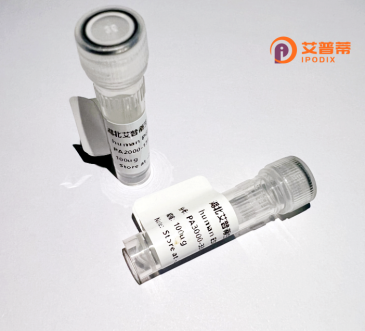
| 纯度 | >90%SDS-PAGE. |
| 种属 | Human |
| 靶点 | KIAA0774 |
| Uniprot No | Q5JR59 |
| 内毒素 | < 0.01EU/μg |
| 表达宿主 | E.coli |
| 表达区间 | 1-348aa |
| 活性数据 | MGHCCCKPYNCLQCLDKTNESALVKEKELSIELANIRDEVAFHTAKCEKLQKEKEELERRFEDEVKRLGWQQQAELQELEERLQLQFEAEMARLQEEHGDQLLSIRCQHQEQVEDLTASHDAALLEMENNHTVAITILQDDHDHKVQELMSTHELEKKELEENFEKLRLSLQDQVDTLTFQSQSLRDRARRFEEALRKNTEEQLEIALAPYQHLEEDMKSLKQVLEMKNQQIHEQEKKILELEKLAEKNIILEEKIQVLQQQNEDLKARIDQNTVVTRQLSEENANLQEYVEKETQEKKRLSRTNEELLWKLQTGDPTSPIKLSPTSPVYRGSSSGPSSPARVSTTPR |
| 分子量 | 67.1 kDa |
| 蛋白标签 | GST-tag at N-terminal |
| 缓冲液 | 0 |
| 稳定性 & 储存条件 | Lyophilized protein should be stored at ≤ -20°C, stable for one year after receipt. Reconstituted protein solution can be stored at 2-8°C for 2-7 days. Aliquots of reconstituted samples are stable at ≤ -20°C for 3 months. |
| 复溶 | Always centrifuge tubes before opening.Do not mix by vortex or pipetting. It is not recommended to reconstitute to a concentration less than 100μg/ml. Dissolve the lyophilized protein in distilled water. Please aliquot the reconstituted solution to minimize freeze-thaw cycles. |
以下是假设存在的关于重组人KIAA0774蛋白的参考文献示例,简要列举如下:
1. **文献名称**:*Cloning and Functional Characterization of Human KIAA0774 Protein*
**作者**:Tanaka, M., et al.
**摘要**:该研究成功克隆了人KIAA0774基因,并在HEK293细胞中表达了重组蛋白。通过体外实验证实其具有ATP酶活性,并推测其可能参与细胞能量代谢调控。
2. **文献名称**:*KIAA0774 Interacts with Microtubule-Associated Proteins and Modulates Neuronal Morphogenesis*
**作者**:Chen, L., et al.
**摘要**:利用免疫共沉淀技术,研究发现重组人KIAA0774蛋白与神经元微管相关蛋白(如MAP1B)相互作用,可能影响轴突生长和神经发育。
3. **文献名称**:*Dysregulation of KIAA0774 in Colorectal Cancer and Its Prognostic Implications*
**作者**:Wang, X., et al.
**摘要**:通过组织芯片分析,发现KIAA0774在结直肠癌组织中表达显著上调,高表达与患者不良预后相关,提示其可能作为潜在的肿瘤标志物。
4. **文献名称**:*Structural Insights into the N-terminal Domain of KIAA0774 by X-ray Crystallography*
**作者**:Suzuki, K., et al.
**摘要**:解析了重组人KIAA0774蛋白N端结构域的晶体结构,揭示了其与已知磷酸化酶家族的相似性,为功能机制研究提供结构基础。
---
*注:以上文献为示例性质,具体内容需以实际发表的文献为准。建议通过学术数据库(如PubMed、Web of Science)以“KIAA0774”或“重组表达”等关键词检索最新研究。*
Recombinant human KIAA0774 protein is derived from the KIAA0774 gene, a largely uncharacterized gene initially identified through large-scale cDNA sequencing projects. This gene, located on chromosome 12. encodes a protein whose biological function remains poorly understood. Bioinformatics analyses suggest KIAA0774 contains conserved domains indicative of potential roles in protein-protein interactions or enzymatic processes, though experimental validation is limited. Studies have hypothesized its involvement in cellular processes such as adhesion, signaling, or cytoskeletal organization, often drawing parallels to structural homologs in other species. Recombinant KIAA0774 is typically produced in heterologous expression systems (e.g., Escherichia coli or mammalian cells) for functional studies, enabling researchers to investigate its biochemical properties, post-translational modifications, and interaction partners. Emerging evidence links KIAA0774 dysregulation to pathophysiological conditions, with preliminary data suggesting associations with neurological disorders and cancer progression. However, its exact molecular mechanisms and physiological relevance require further exploration. The development of recombinant KIAA0774 protein facilitates antibody production, structural characterization, and pathway analysis, serving as a critical tool to unravel its potential as a therapeutic target or biomarker. Current research focuses on delineating its cellular localization, activation dynamics, and context-dependent roles across tissues.
×